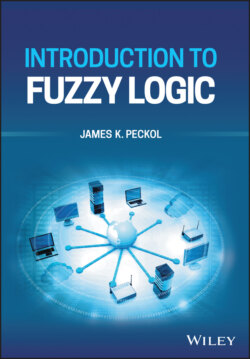Читать книгу Introduction to Fuzzy Logic - James K. Peckol - Страница 16
Linguistic Variables and Hedges
ОглавлениеChapter 5, we begin this chapter with a look at early symbols and sounds and their evolution to language and knowledge. Building on such origins, we introduce the concept of sets and move into the worlds of formal set theory, Boolean algebra and introduce crisp variables.
From the crisp world, we migrate into the fuzzy world and introduce the concept and term linguistic variable as a variable whose values are words or phrases in a natural (or synthetic) language rather than real numbers. Such words are interpreted as representing labels on fuzzy subsets within a universe of discourse, which refers to a collection of entities that are currently being discussed, analyzed, or examined.
We learn that the values for a linguistic variable are generated from a set of primary terms, a collection of modifiers called hedges, and a collection of connectives. Hedges affect the value of a linguistic variable by either concentrating or diluting the membership distribution of the primary terms. We learn that concentrating or diluting a membership distribution can be very clearly represented graphically as discussed in Chapter 4.
We conclude with a discussion of the purpose, creation and use, and manipulation of hedges.
